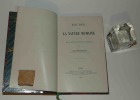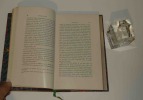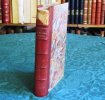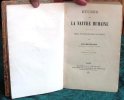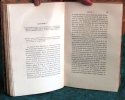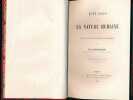28 books for « metchnikoff elie »Edit
-
Century
19th (3)
20th (15)
-
Topics
Anthropology (1)
Biology (3)
First edition (1)
Geriatry (1)
Immunology (1)
Medicine (7)
Metchnikoff elie (9)
Philosophy (11)
Professions guilds (1)
Psychology (3)
Sociology (1)
-
Countries
Belgium (3)
Denmark (3)
France (21)
Switzerland (1)
-
Syndicate
ILAB (12)
SLAM (9)
Études sur la Nature Humaine. Essai de philosophie optimiste. - [FOUNDING AND COINING GERONTOLOGY]
Paris, 1903. 8vo. Nice contemporary half calf with raised bands and gilt lettering to spine. Inner hinge a bit weak, but still tight. 3 leaves with a tear, no loss. Otherwise a nice and clean copy. Inscribed by the author to half-title, to the preeminent Russian Byzantinist F.I. Uspenky. (6), II, 399 pp.
First edition, first issue, presentation-copy, of the groundbreaking work, in which Metchikoff coins ""gerontology"" and establishes the field, which today is considered more important than ever, namely the study of the social, psychological and biological aspects of aging.Earlier on, Metchnikoff had made pioneering studies in immunology, and these led him on to the problems of biological ageing. His first work on the subject is the present, in which he coins the term ""gerontology"" and advances the idea that senile changes result from the toxins produced by bacteria in the intestine. In order to prevent these ""unhealthy fermentations"", Metchnikoff advocates the inclusion of sour milk on one's diet. As his ideas of ""right living"" were so closely connected with the consummation of large amounts of fermented milk or yoghurt made with a Bulgarian bacillus, his name actually came to be associated with a popular commercial preparation of yogurt (although he received no royalties). His studies into the potential life-lengthening properties of lactic acid bacteria, inspired Japanese scientist Minoru Shirota to begin investigating the causal relationship between bacteria and good intestinal health, which eventually led to the worldwide marketing of Kefir and other fermented milk drinks or probiotics, still extremely popular today.Apart from the consummation of yoghurt, Metchnikoff warned of eating uncooked foods, claiming that the bacteria present on them could cause cancer. Metchnikoff claimed he even plunged bananas into boiling water after unpeeling them and passed his silverware through flames before using it.""In his ""Nature of Man"" Metchnikoff argued that when diseases have been suppressed and life has been hygienically regulated, death would come only with extreme old age. Death would then be natural, accepted gratefully, and robbed of its terrors."" (D.S.B. IX: 334-35).He continued writing on ageing and death until 1910. In 1908 he shared the Nobel Prize for medicine with Ehrlich for his work on immunity.The interesting presentation-inscription reads: ""Dorogim Naste I Fedoru/ Ivanovich Uspenskim/ na dobruyu panijat ot Il. Metchnikova."" [In Russian, i.e.: For dear Nastya and Fyodor/ Ivanovich Uspenski/ in good memory from Il. Metchnikov."" Fyodor Ivanovich Uspensky or Uspenskij (1845-1928) was the preeminent Russian Byzantinist in the first third of the 20th century. His works are considered to be among the finest illustrations of the flowering of Byzantine studies in Tsarist Russia.Uspensky was educated at the University of St. Petersburg, with his first thesis (1872) dedicated to Nicetas Choniates. For two decades (1874-94) he read lectures at the Novorossiysky University in Odessa. This position allowed him to spend considerable time abroad.Uspensky's doctoral thesis (1879) dealt with the foundation of the Second Bulgarian Empire. Although he specialized in the Byzantine-Bulgarian relations and investigated the Slavic influence on the Byzantine economy, Uspensky also researched and wrote extensively on the Crusades.In 1894 Uspensky, who shared Slavophile ideals, decided to move to Constantinople in order to study and protect the surviving monuments of Byzantine antiquity, which had been neglected by the Ottoman authorities for centuries. He founded the Russian Archaeological Institute (headquartered at Studion) and presided over its pioneering archaeological research in Constantinople, Asia Minor, Macedonia and Bulgaria. In 1900, he was elected into the Russian Academy of Sciences. With the outbreak of World War I, Uspensky was forced to abandon his work and flee Turkey.Back in Petrograd, the 70-year-old professor was invited to edit the organ of Byzantine studies, ""Vizantiysky Vremennik"". After the October Revolution, he delivered lectures at the Leningrad University (1922-27) and, enduring criticism of the Bolshevik authorities, prepared for publication the results of a lifelong study - a monumental three-volume account of the history of the Byzantine Empire.Uspensky died in Leningrad in 1928. The posthumous publication of his magnum opus, based on numerous unpublished sources and unprecedented in scope, demonstrated the wide range of his scholarship. His book about the Trapezuntine Empire also appeared posthumously.
Études su la Nature Humaine. Essai de philosophie optimiste. - [FOUNDING GERONTOLOGY]
Paris, Masson et Cie, 1903. 8vo. Nice contemporary half calf with four raised bands and gilt lettering to spine. Light miscolouring to spine. A nice and clean copy. (8), 399 pp.
First edition of the groundbreaking work, in which Metchikoff coins ""gerontology"" and establishes the field, which today is considered more important than ever, namely the study of the social, psychological and biological aspects of aging.Earlier on, Metchnikoff had made pioneering studies in immunology, and these led him on to the problems of biological ageing. His first work on the subject is the present, in which he coins the term ""gerontology"" and advances the idea that senile changes result from the toxins produced by bacteria in the intestine. In order to prevent these ""unhealthy fermentations"", Metchnikoff advocates the inclusion of sour milk on one's diet. As his ideas of ""right living"" were so closely connected with the consummation of large amounts of fermented milk or yoghurt made with a Bulgarian bacillus, his name actually came to be associated with a popular commercial preparation of yogurt (although he received no royalties). His studies into the potential life-lengthening properties of lactic acid bacteria, inspired Japanese scientist Minoru Shirota to begin investigating the causal relationship between bacteria and good intestinal health, which eventually led to the worldwide marketing of Kefir and other fermented milk drinks or probiotics, still extremely popular today.Apart from the consummation of yoghurt, Metchnikoff warned of eating uncooked foods, claiming that the bacteria present on them could cause cancer. Metchnikoff claimed he even plunged bananas into boiling water after unpeeling them and passed his silverware through flames before using it.""In his ""Nature of Man"" Metchnikoff argued that when diseases have been suppressed and life has been hygienically regulated, death would come only with extreme old age. Death would then be natural, accepted gratefully, and robbed of its terrors."" (D.S.B. IX: 334-35).He continued writing on ageing and death until 1910. In 1908 he shared the Nobel Prize for medicine with Ehrlich for his work on immunity.
Nebalia. [Histoire du développement du Nebalia]. [ ssai embryologique comparatif]
Saint-Pétersbourg 1868 in-8 chemise demi-percaline beige de l'époque, dos lisse muet, étiquette de titre manuscrite sur le premier plat, qqs lég. rouss
1 f.n.ch. et 48 pp. et 2 planches dépliantes gravées hors texte.Rare étude produite par le futur Prix Nobel de physiologie 1908, Elie Metchnikoff (1845-1916), dont elle constitue la thèse de doctorat (voir Boston Studies in the Philosophy of Science. The Evolutionary Biology Papers of Elie Metchnikoff, 2000).La plaquette, consacrée à l'étude du crustacée Nebalia était vendue séparément 40 kopecks, auprès des commissionnaires de l'Académie des sciences.Ex-libris manuscrit de l'entomologiste français Jules Künckel d'Herculais (1843-1918)
Réactions phagocytaires
Amsterdam, 1904, in-8, de 16 pages, exemplaire broché, Unique édition, parue hors commerce, de ce discours prononcé le 12 novembre 1904 à l'Université de Médecine d'Amsterdam. Metchnikoff fut à l'origine, en 1884, de la découverte des réaction de défense immunitaires des globules blanches (phagocytes) contre les bactéries. Dans cette conférence de 1904 dédié aux étudiants amstellodamois, le biologiste d'origine russe, revient sur plus de 20 années de recherche, et propose une histoire de la biologie bactérienne, de ses propres découvertes et des celles de ses détracteurs. Metchnikoff fut lauréat du Prix Nobel en 1908 avec Paul Ehrlich. Peu courant. DSB IX, p. 331-335. Exemplaire en parfait état. de 16 pages
Études sur la nature humaine. Essai de philosophie optimiste.
P., Masson, 1903, in-8, bradel cart. vert marbré, pièce de titre noire, tr. mouch. (rel. mod.), (4)-II-400 pp., 20 figures in-texte. (GF22D)
Édition originale. "Ce livre, d'une originalité incontestable [...] cherche à nous enlever la crainte de la mort, et à nous réconcilier avec l'idée de l'anéantissement. [...] Les consolations que nous offre M. Metchnikoff sont extrêmement curieuses; il ne croit, ce me semble, à aucune espèce de survivance; je dirai plus : pour traiter un pareil sujet, il n'a fait appel à aucune des ressources qu'auraient pu lui procurer les phénomènes psychiques. Il est resté tout naturellement dans son domaine, qui est celui du naturaliste, domaine où il semble qu'à première vue la philosophie optimiste ne doit pas trouver beaucoup d'arguments. [...] Malgré toutes les objections qu'on pourrait faire à cette philosophie optimiste, nous nous plaisons à reconnaître toute la hardiesse de son originalité. Voilà bien le livre d'un homme sincère." (Alfred Binet, in L'Année psychologique, 1903, vol. 10, n° 1, pp. 548-549).
Leçons sur la pathologie comparée de l'inflammation faites à l'Institut Pasteur en Avril et Mai 1891-
Paris, G. Masson, 1892. 8vo. In contemporary half calf with five raised bands and gilt lettering and ornamentation to spine. Light wear to extremities, corners bumped and a few scratches to the leather. Internally very fine and clean. XI, (1), 239 pp. + 3 coloured plates.
First edition of Metchnikoff’s important work on inflammation. Garrison & Morton 2307
Essais optimistes, avec 27 figures dans le texte. Paris. Maloine. 1907.
1 volume in-8° relié demi-chagrin marro, dos à nrefs, titre doré, 438 p., 27 figures dans le texte. Traces de frottement en reliure sinon très bon état. ÉDITION ORIGINALE.
Phone number : 06.31.29.75.65
Études sur la nature humaine. Essai de philosophie optimiste. Paris. Masson & Cie. 1903.
1 volume in-8° relié demi-chagrin marro, dos à nrefs, titre doré, 399 p.Traces de frottement en reliure sinon très bon état. RARE ÉDITION ORIGINALE.
Phone number : 06.31.29.75.65
Étude sur la nature humaine.
Essai de philosophie optimiste.Seconde édition. Paris, Masson et Cie. 1903 - 405 pages.Reliure demi chagrin rouge de l'époque. Dos à nerfs aux titre et auteur dorés. Accident au dos en tête avec manque. Pas de rousseur. Bon état intérieur. Format in-8°(22x15).
Etudes sur la nature humaine
Paris, A. Maloine & fils 1917 xxiv + 406pp.avec qqs.figures dans le texte, br.orig., 5e édition revue et augmentée, 23cm., bon état
Essais optimistes
Paris, A. Maloine 1907 iii + 438pp., avec 27 figures dans le texte, 1e édition, br.orig., 23cm., non coupé, bon état, F77266
Etudes sur la nature humaine. Essai de philosophie optimiste
Paris, Masson 1903 vi + 405pp.+ quelques figures dans le texte, 2e édition, br.orig. (dos renforcé), 23cm., bon état, F80670
Etudes sur la nature humaine. Essai de philosophie optimiste
A. Maloine Paris, A. Maloine, 1908. In-8 relié demi-basane rouge dos à nerfs soulignés de filets dorés, VII + 405 pages. Très bon état.
Toutes les expéditions sont faites en suivi au-dessus de 25 euros. Expédition quotidienne pour les envois simples, suivis, recommandés ou Colissimo.
Essais optimistes
Paris, P., A. Maloine 1907 In-8 demi-percaline verte, dos lisse, III-438 pp., 27 figures dans le texte. Mors fendillés. Bon exemplaire.
Essais et réflexions sur la prolongation de la vie, entre science et morale, insistant sur les règles l’hygiène et de régime alimentaire. L'auteur (1845-1916), zoologiste et biologiste russe, vint à Paris en 1887. Attaché au laboratoire de recherches de l'Institut Pasteur dont il deviendra le sous-directeur, il fit d'importantes découvertes (dont celle de la phagocytose) et partagea, en 1908, le Prix Nobel de médecine avec P. Ehrilch. Bon état d’occasion
Études sur la nature humaine essai de philosophe optimiste.
Paris, Masson et cie, 1903; in-8, 399 pp., cartonnage de l'éditeur.
.
Trois fondateurs de la médecine moderne : Pasteur, Lister, Koch (Nouvelle Collection Scientifique)
Librairie Félix Alcan. 1939. In-12. Broché. Etat d'usage, Couv. légèrement passée, Dos plié, Papier jauni. 195 pages.. . . . Classification Dewey : 925-Savants, explorateurs
Nouvelle Collection Scientifique, dirigée par Emile Borel. Préface de Et. Burnet. Classification Dewey : 925-Savants, explorateurs
ETUDES SUR LA NATURE HUMAINE, ESSAI DE PHILOSOPHIE OPTIMISTE
Masson & Cie, Libraires de l'Académie de Médecine, Paris. 1904. In-8. Broché. Etat d'usage, 1er plat abîmé, Dos satisfaisant, Intérieur frais. 405 pages. Illustré de gravures en noir et blanc dans le texte. Etiquette de code sur la couverture. Quelques tampons de bibliothèque. Annotations en page de faux-titre (ex-libris). Quelques annotations au crayon dans le texte.. . . . Classification Dewey : 100-PHILOSOPHIE ET DISCIPLINES CONNEXES
2e édition. Les désharmonies de la nature humaine. Tentatives pour atténuer le mal résultant des désharmonies de la nature huamaine. Ce que peut faire la science... Classification Dewey : 100-PHILOSOPHIE ET DISCIPLINES CONNEXES
Etudes sur la nature humaine.
Essai de philosophie optimiste 3ème édition. P. Masson 1905. In-8 (23/14cm). VI-405 pages. Broché (le 1er plat manque, dos cassé)
20 figures dans le texte. Philosophie sur la vieillesse. Cité par Caillet n° 7470. Très bon état du texte imprimé sur papier glacé, mérite une reliure.
Leçons sur la pathologie comparée de l'inflammation faites à l'Institut Pasteur en Avril et Mai 1891
G.Masson, Paris 1892, 14x22,5cm, relié.
Edition originale illustrée de 65 figures dans le texte ainsi que de 3 planches en couleurs en fin de volume. Reliure en demi chagrin marron chocolat, dos à cinq nerfs, indication dorée d'obtention de prix à la faculté de médecine de Toulouse, plats de papier marbré, petites taches de décoloration en pied du premier plat, gardes et contreplats de papier à la cuve, coins émoussés. Agréable état intérieur. Rare et important ouvrage. - Photos sur www.Edition-originale.com -


Phone number : 01 56 08 08 85
Essais optimistes.
A.Maloine. 1907. In-8. Broché. Etat d'usage, Tâchée, Dos satisfaisant, Quelques rousseurs. 438 pages - quelques figures en noir et blanc dans le texte - quelques rousseurs sans conséquence sur la lecture - papier en renfort sur le dos - annotation sur la coiffe en tête.. . . . Classification Dewey : 500-SCIENCES DE LA NATURE ET MATHEMATIQUES
Sommaire : Etude sur la vieillesse - la longévité dans la série animale - études sur la mort naturelles - faut il tenter de prolonger la vie humaine - sur quelques points de l'histoire des sociétés animales - pessimisme et optimisme - Goethe et Faust - science et morale . Classification Dewey : 500-SCIENCES DE LA NATURE ET MATHEMATIQUES
Etudes sur la nature humaine. Essai de philosophie optimiste. 3e édition.
P., Masson, 1905, in 8° broché, VI-405 pages ; dos cassé avec manque de papier ; plats détachés et effrangés.
...................... Photos sur demande ..........................


Phone number : 04 77 32 63 69
ESSAIS OPTIMISTES.
Paris, Maloine, 1914. In-8 broché, XVI-446 pages, 27 figures in-texte. Dos frotté avec petit accroc de papier, intérieur frais.
Etude sur la vieillesse, la Longévité dans la série animale, Etudes sur la Mort naturelle, faut-il tenter de prolonger la vie humaine ?, Pessimisme et Optimisme, Science et morale...
Etudes sur la nature humaine. Essai de philosophie optimiste, Masson, 1904, in-8, 405 p.
Demi reliure, parfait état
Essais optimistes 2 éle édition revue et augmentée in-8,broché 446 pages
A.Maloine Editeur 1914
Bon état
 Write to the booksellers
Write to the booksellers![Études sur la Nature Humaine. Essai de philosophie optimiste. - [FOUNDING AND COINING GERONTOLOGY]. "METCHNIKOFF, ÉLIE.](https://static.livre-rare-book.com/pictures/LLX/48299_1_thumb.jpg)
![Études sur la Nature Humaine. Essai de philosophie optimiste. - [FOUNDING AND COINING GERONTOLOGY]. "METCHNIKOFF, ÉLIE.](https://static.livre-rare-book.com/pictures/LLX/48299_2_thumb.jpg)
![Études sur la Nature Humaine. Essai de philosophie optimiste. - [FOUNDING AND COINING GERONTOLOGY]. "METCHNIKOFF, ÉLIE.](https://static.livre-rare-book.com/pictures/LLX/48299_3_thumb.jpg)







